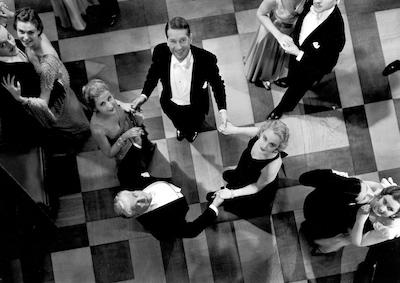Listen to a KCRW interview with author Joseph McBride (How Did Lubitsch Do It?) and Nicola Lubitsch.
Ernst Lubitsch was not only one of the greatest film directors of the classical Hollywood period, he was also one of the most modern. What made Lubitsch modern was that he was a director of surfaces and illusions, insisting that what was not shown was as important as what was visible on the screen. The so-called “Lubitsch touch” implied that a closed door only pointed to the events that happened behind the door, i.e. usually sex. Lubitsch’s films are filled with objects to which the director lovingly cuts away in close-up, utilizing them as metaphors to visualize that which dare not be shown. For example, a cutaway to the purse of a rich widow in Trouble in Paradise visualizes the wealth to be stolen, but also symbolizes her womanhood. Nothing is what it seems to be. A romantically lighted gondola in the same film turns out to be a garbage “truck.” Similarly, when the actors in a Lubitsch film play their roles, they are fully conscious of being actors playing a role, creating a kind of mirroring of emotions that consistently demolishes any hint of sentimentality or melodrama and allows Lubitsch’s comedies to be read politically as treatises on contemporary sexual politics.
Born in Berlin’s Jewish garment district, Lubitsch evolved from a director of lowbrow slapstick comedy in Germany to a director of sophisticated, upper-class marital comedies in Hollywood, but he also remained very much a director of Jewish humor. As a result, Lubitsch favors satire and irony in his comedies of upper class sexual relations. But there is also a strong anti-authoritarian streak in his work, symbolized by his cocky apprentices, and a lack of respect for power, indicated by his willingness to pull back the curtain and expose its nasty underbelly.
Film historian Joseph McBride has written a new book about Lubitsch, How Did Lubitsch Do It?, and becomes the occasion for this retrospective look at one of Hollywood’s greatest masters. McBride will be in person on July 6 and July 7 to sign copies of his book, which will be for sale in the lobby of the Billy Wilder Theater beginning at 6:30 p.m. each night. Check for additional details for each program below.
Series curated by Jan-Christopher Horak.






 Mobile Navigation
Mobile Navigation









